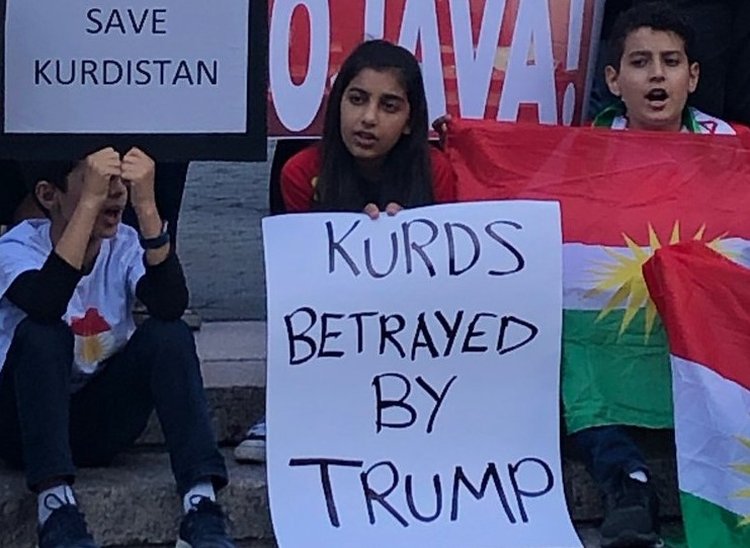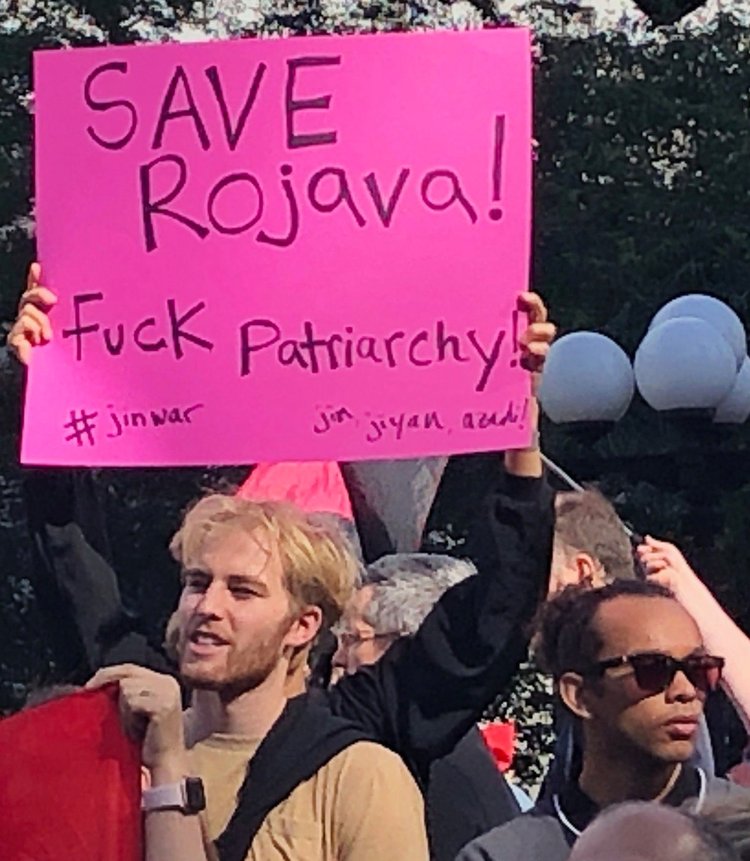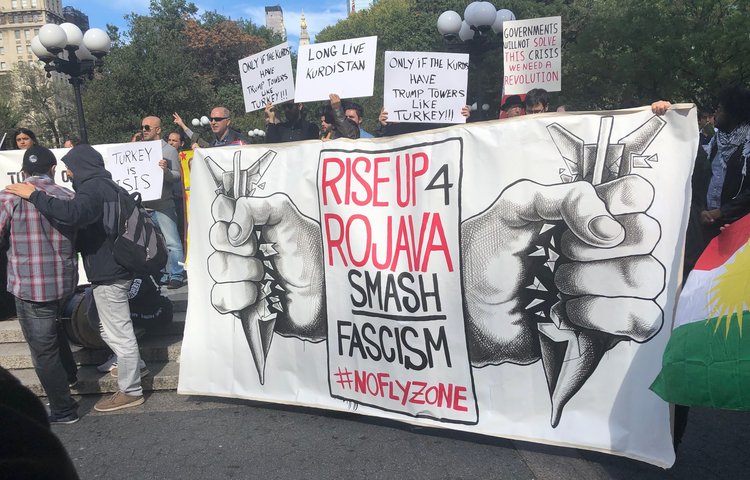by the International Work Team of Liberation Road
The announcement that US troops and US-supported Syrian forces would be pulled back from the northern border of Syria caught many people by surprise. It is not clear why it should have been a surprise since Trump had indicated that this was coming. Turkey has been pushing for the USA to get out of the way so that they can move their forces against the Kurdish Democratic Union Party (known by their acronym, PYD) and its military arm, the People’s Protective Units (known by their initials “YPG”) in the region.
When the Syrian Revolution began to unfold in 2011, it faced a major challenge that can be described as the “Kurdish national question.” The Kurds, a largely Muslim ethnic group found in Turkey, Syria, Iraq, Iran and Armenia, have been an essentially stateless people suffering ethno-national oppression for centuries. The large Kurdish national minority in Turkey has been under constant repression by numerous Turkish governments that refuse to acknowledge their existence and even their language. Led by the Kurdistan Workers Party (PKK), armed struggle unfolded in Turkey against the Turkish state and has been met with a brutal government response. This struggle spilled over, at different points, into Syria and Iraq. The Turkish drive to smash the Kurdish Democratic Union Party is a manifestation of that spill-over.

The PYD and the Syrian Opposition
In 2011, the anti-Assad movement in Syria found itself at a historic crossroads. A truly mass movement had emerged with, originally, a reform agenda and later, a revolutionary, democratic agenda. Yet, in ways that sound all too familiar, a debate unfolded within the Syrian opposition over the Kurds and other ethnic minorities. The Kurds, in particular, asked the opposition to recognize their struggle against oppression and their demand for autonomy. They also asked that the term “Arab” be removed from the name of Syria (i.e., the Syrian Arab Republic) since the Arabs, though the majority, were not the only ethnic population. The demands of the Kurds were largely ignored, leading them to withdraw from the formal opposition.
Under the leadership of the PYD, northern territories of Syria, known as Rojava, were taken by the PYD and their military units, the YPG. They made a strategic decision to not enter into war against Assad but to develop an autonomous region. Much has been written about this experiment, including by renowned leftist author Meredith Tax (see: A Road Unforeseen: Women fight the Islamic State), pointing to the radical practices advanced by the PYD regarding feminism, popular control and ecological sustainability. At the same time there have been criticisms of the PYD for its distancing itself from the Syrian Revolution as well as its relationships with Arabs in the predominantly Kurdish areas of northern Syria.

The PYD/YPG came to be known by many US audiences due to the fight that it undertook against Daesh/ISIS. They are largely responsible for the defeat of Daesh in Syria and, ironically for a left-wing formation, they found themselves in a curious alliance with the USA against Daesh. With US support, the PYD established the Syrian Democratic Forces which fought Daesh under Kurdish leadership.
Turkey’s Response
The Turks, who have always viewed the PYD as an extension of the PKK (the former sharing much of the politics of the latter), saw the emergence of the PYD and Rojava as a threat to Turkey and as a potential base area for the PKK. These concerns mirrored those that they had in the 1990s when the USA established a no-fly zone over the Kurdish majority areas of Iraq and an autonomous region developed. The Turkish government came to live with the reality of the Kurdish autonomous zone in northern Iraq but deeply fears what will unfold with a Kurdish region in northern Syria. Thus, they are prepared to move in and destroy the PYD experiment. Indeed, destroy the experiment and the people.
The US state has been divided over how to handle Syria from the very beginning of the Syrian democratic uprising. When it comes to Rojava, however, the success of the PYD/YPG in fighting and defeating Daesh led to a grudging level of respect. Thus, when Trump suggested pulling US troops out of Syria and, in effect, ending all support to the PYD/YPG and the Syrian Democratic Forces, there was an uproar in both Republican and Democratic circles. Part of this was the result of a strategic calculation that while Daesh has been defeated, it has not been destroyed and the elimination of the PYD/YPG may unleash its resurgence. Part of this may reflect some level of sympathy for elements of the Kurdish cause. And still other calculations may reflect a deepening suspicion of the Turkish government.
Trump appears to be appeasing both the Turks and the Russians, both of whom want the USA out of Syria. Neither the Turks nor the Russians have any interest in a modus vivendi with the Kurds; both, in different ways, wish for them to be eliminated. Assad, now more firmly in power, also wants the PYD/YPG defanged, though he does not want Turkish troops in northern Syria.
Dilemmas for the US Left
The complications of the whole situation surrounding Syria have twisted the guts of much of the US Left. There are some forces who believe that any head of state who the US government opposes—like Syria’s Assad– is necessarily anti-imperialist and should be supported by US leftists. These leftists were prepared to condemn the Syrian Opposition to Assad for receiving even the hint of support from the US military. Yet most of these US formations have been silent about this de facto alliance between the PYD and the USA. We agree that solidarity with the PYD is the correct position, but would question the double standard that some in our movement seem to be applying to the Syrian Opposition versus the PYD.
The PYD has shrewdly utilized contradictions between and among global reactionary forces in order to build a fight for ethno-national freedom. One can hold criticisms of the work of the PYD and even their decision to stand back from the Syrian Revolution. In either case, that should not stop the Left from expressing genuine solidarity with the PYD and actively opposing the green light that Trump has given to a Turkish invasion of northern Syria.
While it can and should be argued that all foreign forces should withdraw from Syria—indeed, those foreign forces including the Russians, Iranians, Saudis, Qataris and the USA internationalized the Syrian civil war in destructive ways—the reality of the moment is that US forces should be withdrawing as part of an international agreement, guaranteeing the territorial integrity of Syria as well as freedom for Rojava and other autonomous or liberated zones. In this sense, Trump’s unilateral declaration of withdrawal is not a reflection of the success of the peace and justice movement in pressuring the Trump administration. Rather, it reflects the cynical geopolitics of the Trump administration and its relationship with other nation-state actors.
None of these nation-state actors, including but not limited to the USA, Turkey, Russia, Iran, Saudi Arabia and Qatar, give a damn for the people of Syria, and certainly care naught for the Kurds. For Turkey in particular, the Kurds simply stand in the way of the Erdogan regime’s ethnic cleansing and regional hegemonism.
Our cry should be one of solidarity with the PYD; solidarity with the Syrian democratic movement; and withdrawal of all foreign forces as part of an international agreement!

This article was written on Friday, October 11th. Things may have changed by the time you read this.